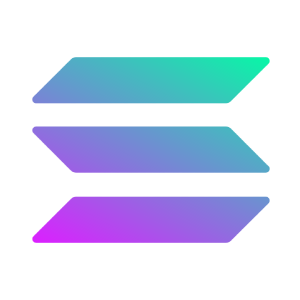- Back to menuNews
- Back to menuPrices
- Back to menuResearch
- Back to menuConsensus
- Back to menuSponsored
- Back to menu
- Back to menu
- Back to menuResearch
- Back to menuWebinars & Events
- Back to menu
About Solana
Solana (SOL) is a highly scalable blockchain platform designed to enable fast, low-cost, and decentralised applications. Its hybrid consensus model, combining Proof of Stake and Proof of History, ensures efficient transaction processing. SOL is the native cryptocurrency used for fees, staking, and governance. Solana was founded by Anatoly Yakovenko and launched in 2020 with a focus on mass adoption, supporting a wide array of use cases including DeFi, NFTs, and gaming.
Solana is a blockchain platform designed to facilitate decentralized app (dApp) development and support crypto-currency transactions. What sets Solana apart is its hybrid protocol system and unique timestamp technology, which is centered around a mechanism called Proof-of-History (PoH). This system creates a verifiable and secure timestamp for each transaction, which allows nodes to process transactions without needing to communicate with one another, significantly speeding up the transaction processing time.
Solana utilizes a unique model, where PoH works in tandem with a Proof-of-Stake (PoS) consensus mechanism. PoH allows for the recording of the order of events and the time that has passed between them, which mitigates the need for traditional consensus-building processes. The PoS mechanism then finalizes these transactions and secures the network by allowing validators with a stake (investment) in the system to propose and vote on the validity of new blocks.
"The goal of Solana is to carry transactions as fast as news travels around the world," according to Anatoly Yakovenko, the co-founder and CEO of Solana Labs. With its architectural design, Solana has the capability to handle thousands of transactions per second, positioning it among the faster blockchain networks. This focus on transaction speed is in line with Yakovenko's stated vision for the blockchain. In addition, Solana's fee model, which emphasizes lower transaction costs, may be seen as an appealing feature for both businesses and individual users.
SOL is used in two ways:
- Pay for transaction fees: Though Solana's fees are supposed to be cheaper than those of other cryptocurrencies, it still charges a fee to send transactions or run smart contracts, the blockchain-based computer programs that cut out intermediaries from digital transactions. Smart contracts are the building blocks of more complicated apps on Solana, such as finance apps or apps for music streaming.
- Staking: Like many other blockchains, Solana is secured through a consensus mechanism. People who want to help secure the cryptocurrency by being a "validator," can "stake" some of their SOL, or lock it up to secure the network and earn money while doing so.
Solana is an inflationary cryptocurrency with no hard cap on the total number of tokens. It has a starting annual inflation rate of 8%, which will decrease by 15% every year until it reaches 1.5%, which will be the fixed long-term rate.
Thirty-seven percent of the SOL tokens that were initially distributed went to investors, 25% was split between Solana's team and the Solana Foundation, the nonprofit steering development of the cryptocurrency, and 38% was sent to Solana Foundation's community fund reserve.
After the launch of SOL in March 2020, SOL's price bounced between $0.50 and $1.50 for the rest of the year. Then, SOL became one of the top-performing assets amid the crypto bull run in 2021, as its price hit $55.91 by May 2021. Though it dipped to as low as $23.49 in July 2021, SOL's price surged again in the second half of the year, hitting its all-time high of $258.93 in November 2021.
